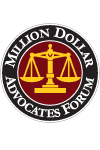No-Fault Arbitration Info
Minnesota No-Fault Arbitration Information
Below is a reprint of an information pamphlet which is provided to you at the time your arbitration for no-fault benefits is filed by Fullerton Law, P.A. As always, any questions should be directed to the Fullerton Law, P.A. personal injury attorney handling your case.
What You Should Know About Your No-Fault Arbitration Hearing
Occasionally, disputes over medical bills, replacement services and/or wage loss benefits arise between you and your insurance company after your automobile accident. Minnesota No-Fault Arbitration is designed to provide you and your insurance company with a method of resolving their differences faster and more economically than litigation.
Arbitration is a less formal and much quicker process than litigation. A dispute is given to a neutral arbitrator, and each party is given the opportunity to present its side of the dispute at a scheduled hearing. After the hearing, the arbitrator determines how the matter is to be resolved.
What is the AAA?
The American Arbitration Association (AAA) is a private, non-profit organization dedicated to the resolution of these types of disputes. The AAA is the NEUTRAL ADMINISTRATOR of the arbitration process. The Association does not act as the arbitrator, nor does it favor either side. The AAA is not connected with the insurance industry nor with the State of Minnesota in any way.
Who Are Case Administrators?
Case administrators arrange for the appointment of an arbitrator and the scheduling of the hearing. They also handle all communication between the parties and the arbitrator, except during the hearing. When the award has been finalized by the arbitrator, an Administrator distributes copies of the arbitrator’s award to the parties.
Who Is the Arbitrator?
The arbitrator is an attorney who has five or more years of experience as a lawyer in the field of automobile injury law. Arbitrators’ qualifications are reviewed by a Standing Committee of the Minnesota Supreme Court before they are permitted to act as an arbitrator. An arbitrator functions as an impartial decision-maker who derives authority from the Minnesota No-Fault Act. After reviewing the rules, and accepting testimony and evidence from both parties, the arbitrator makes his/her decision.
How Does the Process Begin?
The arbitration process begins, or is initiated, when we file a Petition for Arbitration with the American Arbitration Association. We can do that either once your benefits have been denied by the insurance company, or if the insurance company fails to pay benefits within thirty days after a claim has been presented to them. The administrative filing fee to do this is $50.00 which we pay to the AAA at the time the Petition is filed.
What Happens Next?
You are considered the Claimant in this process. The AAA will send a letter to the insurance company, informing the claims representative that an arbitration has been initiated by Claimant. The insurance company is billed for the appropriate administrative fee ($200). The AAA then sends a list of four randomly selected qualified arbitrators to the parties. Each party may cross off one of the arbitrators listed and rank the remaining three in order of preference. The AAA will invite the most acceptable arbitrator to serve on the case. The arbitrator is bound by the Code of Ethics to disclose any relationships which might indicate bias or a conflict of interest in the case. A copy of any disclosure made by the arbitrator is sent to each of the parties. If the arbitrator accepts the appointment, the parties are notified, and availability is submitted for scheduling. A hearing is scheduled in accordance with the Rules, using the most mutually agreeable date based upon availability submitted by us, the insurance company’s attorney, and the arbitrator.
How Long Do We Wait?
The arbitration date will usually be scheduled within four to six months from the date of filing. This is to give both sides an opportunity to gather information and prepare for the hearing. This process is usually much quicker than filing a lawsuit which in the metro area can take one to two years to come up for trial.
When and Where Does the Arbitration Hearing Take Place?
The hearing will take place on a date that is mutually acceptable for the arbitrator and the two disputing parties. The location of the hearing may be the arbitrator’s office, the AAA office, or some other appropriate site agreed upon by the parties.
Can a Hearing Be Postponed?
The Association charges a $100 postponement fee against the party requesting the postponement of a scheduled hearing. If a hearing must be rescheduled, availability is again submitted by the parties, and a hearing is scheduled on a new mutually acceptable date.
How Do We Prepare for a Hearing?
We gather all pertinent information to support our side of the claim, including medical records and reports, employment records, and any witnesses. The insurance company, usually through their own attorney, does the same. This allows the parties to present their cases in an organized and concise fashion, giving the arbitrator a better understanding of the case.
You should meet with your attorney a day or two before your hearing to discuss and prepare for your testimony at the hearing.
Before the arbitration you should think about your injuries and symptoms and be prepared to discuss them in depth at the hearing. For example, be able to list the problems you have had, the times you have suffered from them and how these injuries have affected your personal life. You should be able to list all of your symptoms from the accident and be able to tell how they have changed over time. You will also need to explain how the treatment you have received has aided in your recovery and return to work/activities.
Be prepared to state why you feel you need ongoing chiropractic/medical care and how your care has improved your condition over time.
Make sure you notify your attorney as soon as possible of any unpaid chiropractic/medical bills, mileage, prescriptions, replacement service expenses, and time you have missed from work.
Thorough preparation will help us present your facts in a clear, concise manner and increase the chances of a favorable result.
How is the Hearing Conducted?
An arbitration hearing is informal. No courtroom or jury are used, and there is normally no court reporter present. It is important to arrive on time and be prepared to proceed. Each party is given the opportunity to explain its side of the case to the arbitrator. The arbitrator is also free to ask questions and then the arbitration is closed.
What Happens After the Hearing?
The arbitrator is allowed thirty days after the hearing is closed within which to make his/her award. The award will then be sent to the parties by the AAA. The award is legally binding upon the parties and can be enforced by the courts.
What is an Award?
An Award is the arbitrator’s legally binding decision made after an arbitration hearing. The arbitrator has the authority to award the total amount claimed, a partial amount, or deny the claim based on the evidence presented. The award also includes the amount of the arbitrator’s compensation and the party responsible for paying this compensation, and addresses the matter of how the parties’ filing fees shall be borne.



